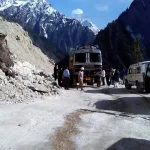The economic potential of the erstwhile state of Jammu & Kashmir wasn’t properly realised. The investors were reluctant to bet on Kashmir keeping in view its legal, political, and geographical dynamics. In January 2024, at the Vibrant Gujarat Global Summit, Lieutenant Governor Manoj Sinha encouraged prospective industrialists within and outside India to make investments in the region saying that “Investing in Jammu Kashmir means investing in the unity and integrity of Bharat.” Moreover, LG Sinha also stated that “Progressive reforms, transparent land allotment policies, and attractive incentives have positioned J&K as a preferred investment destination” which paved a path for foreign direct investments into the valley.
The Government of India has been recommended by a parliamentary panel to promptly follow up on investment possibilities offered by certain UAE companies in the UT of Jammu & Kashmir. The first foreign business to make a large foreign direct investment (FDI) in J&K worth Rs. 500 crores is UAE based Emaar Group, the developer of Burj Khalifa. In the year 2023, the company unveiled plans for constructing a shopping mall and an IT tower in Srinagar. According to publicly available information, this retail center, dubbed the “Mall of Srinagar” will employ 7,500 people, making it J&K’s only major employer. According to the information, it was anticipated that the mall will open for business by 2026.LG Sinha while setting the foundation of Mall in Sempora, Pampore said that the project is “a new dawn of limitless possibilities and Mall of Srinagar will have transformative impact on the Union Territory (UT) and boost the infrastructure, employment generation and ease of living.”
The Jammu and Kashmir Industrial Policy 2021-30 is enacted with an aim to establish a conducive ecosystem for industry, which attracts investments in focus sectors leading to balanced, sustainable, equitable and environmentally friendly industrial development thereby creating employment opportunities for the youth, income generation and overall development of the region. However, while delving into various practical aspects to comprehend as to why these anticipated investments from outside Kashmir never materialised, prima facie, it appears that there are various challenges and gaps between the ambitious plans to attract investments and the ground realities faced in Jammu & Kashmir. Here’s a breakdown of the key issues identified:
Legal Constraints
One of the critical factors impeding substantial investments in Jammu & Kashmir is the delay in acquisition of land by private investors due to continuing confusion in the changed laws and rules regarding ownership/leasing of land especially agricultural land, the land available for establishing new industries and businesses. This limitation poses a significant challenge for investors, particularly in large-scale projects like big industries, real estate, and horticulture.The land available in already existing industrial estates and newly established ones of the government have failed to address this issue due to limits in unit sizes and restrictions on use of land granted to units in terms of the existing industrial policy on leasing/subleasing of such land.
Present agreements between industrial estates, and investors often prohibit subleasing, hindering investors from maximizing the utility of their properties.To catalyse economic growth and foster a conducive investment environment, it is imperative to reconsider subleasing regulations and explore exemptions tailored to support transformative projects. Infrastructure projects being established on public private partnership basis never faced such problems since the land required was acquired by the government. The clarity and ease in acquiring the land for private investment needs specific attention by the government by bringing necessary changes in the laws, rules, and policy. While advising investors on establishing business in J&K we have found that delay in bringing the rules for leasing of agricultural land is a major hurdle. Another factor which is causing delays is the ignorance of the latest changes in laws and rules of the dealing staff at the local level which can be addressed by training and sensitizing the said staff to create a conducive environment for private investors in J&K.
Although the Government has a policy to treat companies having FDI differently as regards allotment of land to them, but a lot needs to be done in making land available to them and exemptions for investors undertaking significant projects exceeding specific investment thresholds, to facilitate and maximize private investment in J&K.
Deficit Electricity
Another critical concern is the acute power shortage plaguing the region, resulting in prolonged daily outages. This shortage not only affects industrial productivity but also impacts essential services like healthcare and education.
The J&K Industrial Policy 2021 – 30 is clear on the point that the government will ensure regular and adequate supply of power to the industrial estates, parks, and growth centres etc.The Valley is grappling with a severe power shortage causing acute inconvenience with daily outages up to 16 hours. According to the reports, Kashmir requires 1800 MW of power to maintain electricity for 16 hours. For round the clock supply, 2200 to 2300 MWs is required. To overcome this difference, the deficit electricity is being purchased from the Northern Grid @ Rs 42 per unit. As a result, businesses and industries are compelled to rely heavily on costly diesel generators to maintain operations. This reliance not only inflates operational expenses but also contributes to environmental degradation due to increased diesel consumption and emissions.
Furthermore, the environmental repercussions of heavy diesel usage are alarming. Diesel generators emit harmful pollutants such as nitrogen oxides (NOx) and particulate matter (PM), which contributes to air pollution and pose serious health risks to local communities. Investors, particularly major players, undertake a thorough assessment of numerous factors before deciding to invest in regions such as Jammu & Kashmir, which face significant challenges like power shortages. The decision to invest in an area with inadequate electricity supply, particularly for large-scale projects like malls that have substantial energy requirements, prompts valid questions about energy sourcing. The reliance on expensive alternative power solutions such as diesel generators can substantially impact profitability and overall return on investment (ROI). Unchecked, these additional costs can erode profit margins, presenting a deterrent to potential investors considering commitment to the region. Therefore, addressing critical infrastructure needs, particularly reliable power supply, is essential to attracting and sustaining substantial investments in Jammu & Kashmir’s economic development.
Basic Infrastructure Amenities and Environmental Sustainability
The city of Srinagar alone generates a staggering amount of solid waste, exceeding 13,000 metric tons per month, with daily disposal rates around 450 metric tons. The primary landfill site at Achan is overburdened and unable to handle the volume of waste generated, leading to widespread dumping of waste even into sensitive water bodies like Dal Lake. Lack of waste segregation facilities exacerbates the problem, resulting in uncontrolled dumping and contamination of the environment. Improper solid waste disposal poses severe environmental and health risks, including soil contamination, water pollution, and air quality deterioration.
Industrial areas lacking common effluent treatment plants (CETPs) force industrialists to either dispose of harmful effluents into defunct drainage systems or invest in costly individual effluent treatment plants (ETPs) or sewage treatment plants (STPs). However, these individual solutions are often insufficient due to the overall inadequacy of the drainage infrastructure. The limited provision of a dust bin as the primary waste disposal solution is inadequate for industrial operations that generate large volumes of industrial waste, leading to accumulation and potential environmental hazards and contribute to the creation of unhygienic environments within industrial areas.The lack of proper infrastructure undermines the region’s appeal as an investment destination, deterring potential investors concerned about environmental sustainability and regulatory compliance.
Drawing comparisons with cities like Hyderabad, which has ranked second amongst 17 major cities in terms of ease of doing business, J&K could be enlisted in these cities and be considered a market worth considering for being a stable investment option with high returns only if J&K’s industrial urbanisation plan includes concrete and robust basic infrastructure amenities. Addressing the challenges of solid waste management, sewage systems, and drainage infrastructure is critical for fostering economic development and attracting investments in Jammu & Kashmir.The government’s proactive measures to improve environmental conditions and infrastructure amenities will be instrumental in attracting reputed industrial houses and investors seeking stable and sustainable business opportunities and ensuring long-term sustainability.
Single-Window System
Despite promising announcements and progressive legislative measures like the Jammu & Kashmir Single Window (Industrial Investment and Business Facilitation) Act, 2008, aimed at enhancing the ease of doing business, the ground realities continue to pose formidable challenges for investors. The Jammu & Kashmir Single Window Act was envisioned as a cornerstone of investment facilitation, streamlining licensing, permissions, and approvals to accelerate industrial development. However, the implementation of the Single Window Act has fallen short of expectations. Despite digitization efforts, the application process remains convoluted, requiring regular physical visits to multiple departments for licenses and NOCs. The extensive wait time, spanning several months, for securing electricity sanction and environmental clearances significantly impedes industrial operations.
Delays in approvals not only hinder project timelines but also impact environmental compliance and sustainability efforts. Simplifying the clearance process and enhancing coordination between regulatory agencies are imperative for fostering a conducive investment climate. Bureaucratic delays and lengthy approval timelines deter potential investors, perpetuating a climate of uncertainty and inhibiting economic growth. The failure to adhere to time-bound approvals undermines investor confidence and erodes the Act’s credibility. Bridging the gap between policy intent and practical implementation is imperative to transform Jammu & Kashmir’s investment climate. The Single Window Act holds tremendous promise as a catalyst for economic growth, provided it is complemented by effective governance and stakeholder engagement to identify bottlenecks and implement targeted reforms.
Conclusion
To unlock the true economic potential of Jammu & Kashmir, a comprehensive and integrated strategy is imperative. Clarity on law and amendment of rules and regulations relating to use of available land by the industry can enhance operational viability and investor confidence, promoting economic growth and job creation. Addressing persistent challenges in power supply, water scarcity, and bureaucratic red-tape is crucial to fostering an investor-friendly environment. Prioritizing infrastructure development, including power and water supply, sewage systems, and waste management, is essential for sustainable industrial expansion. Adequate infrastructure not only supports existing industries but also attracts new investments and fosters economic diversification.
While certain sectors like tourism and filmmaking receive focused attention, similar dedication is required for industrial development. Consistent government support across all sectors is essential to create an enabling environment for economic growth and prosperity. Engaging with industry stakeholders, including investors, industrialists, lawyers, and policy makers/regulatory authorities, is essential for identifying systemic bottlenecks and implementing targeted reforms. Meaningful dialogue and collaboration with local communities and businesses are essential for informed policy-making and effective implementation.
In conclusion, realizing Jammu & Kashmir’s economic potential requires concerted efforts and unwavering commitment. By revisiting policies, enhancing infrastructure, resolving critical service challenges, and emphasizing environmental sustainability, the region can position itself as a thriving investment destination.
(Adv Romaan Muneeb is a Corporate Lawyer; Partner at Malik and Romaan Law Offices, Srinagar, J&K. And Osheeba Bashir is a legal intern. The authors can be reached out at: [email protected])








